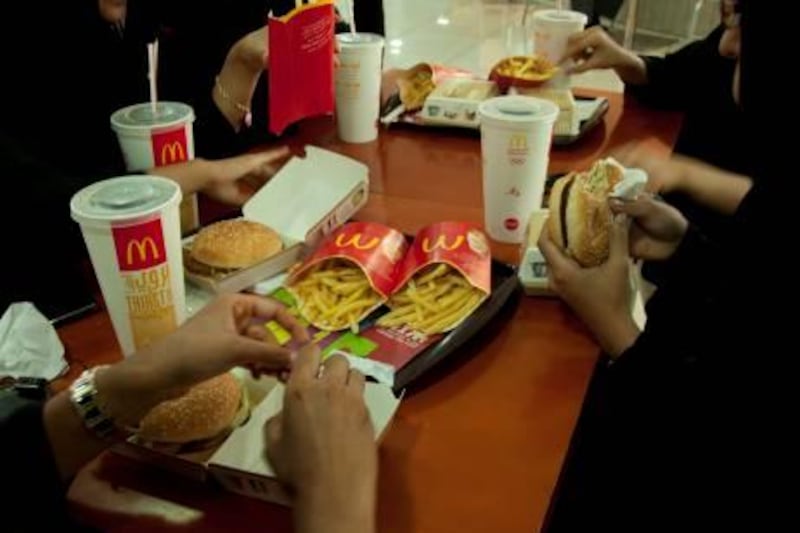UAE residents include fast food in their diets because it is the least-expensive dining choice, a new survey says.
Fifty-nine per cent of the survey's respondents admit that they eat fast food at least once a week and about the same number - 60 per cent - said it represents good value for money.
The results are worrying to experts in the health and nutrition fields, as the country has a high percentage of obesity and diabetes.
"This is really the root of the problem," said Dania Bardaki, a nutritionist and dietician in Abu Dhabi.
"It is so much cheaper to eat a full meal at all the fast food chains that offer combo deals - a meal that's filling and often delicious - than it is to eat somewhere with healthier options cooked with fresh produce, or to buy groceries and make a healthy meal at home.
"Since that's the case, of course everyone is going to head to the food court at the mall and grab a burger or some fried chicken.".
The poll, conducted in March among 757 UAE residents, was commissioned by Al Aan TV's Nabd al Arab (Arabs' Pulse) programme and carried out by YouGov Siraj. The results have a margin of error of approximately four per cent,
Dana Shadid, a producer for the programme, said the results showed a lack of awareness about the risks of too much fast food.
"Despite some healthy options being available at some fast-food outlets, which have started offering salads or grilled chicken sandwiches with lighter dressing, I really doubt people make the healthier choice."
The poll cements that notion: 65 per cent of respondents were indifferent to the healthy options on offer at fast-food chains.
Moreover, only one in four believed fast food was "not healthy at all". More than half agreed that it is unhealthy, but find it acceptable as a treat every once in a while, and 18 per cent consider it a healthy choice, as long as one does not eat too much of it.
Asked to select the three least healthy activities from a list of eight options, only 23 per cent chose "eating fast food". Seven out of 10 chose smoking followed by drinking alcohol (61 per cent), smoking shisha (47 per cent), not sleeping enough (28 per cent), not exercising enough (26 per cent), and drinking soft drinks (25 per cent).
"You cannot eliminate fast food from our lives," Ms Shadid said. "It's become a part of our culture whether we like it or not, but what you can do is introduce the idea of balance.
"If kids are taught at home and at school what constitutes healthy eating, and what are the right choices to make, and if they are taught the importance of exercise, then it balances out when they have a meal from a fast-food restaurant every once in a while."
But knowing what is healthy and living by that knowledge are different. Parents say one thing and do something else entirely, said Sami Tufaili, a family doctor in the capital.
"They know they have to eat several servings of fruits and vegetables a day and limit their carbohydrates and fat," he said. "But they give their kids chips as snacks; they make meals that include pasta and potatoes and rice, and they say fast food is bad but eat it anyway."
While six out of 10 respondents said they consume fast food at least once a week, they said they would eat it more often if certain conditions were met.
Two in five (41 per cent) said that they would be encouraged to eat more fast food if better-quality ingredients were used. One third admitted they would prefer fast-food outlets to have higher food-safety standards.
Nevertheless, more than a quarter (26 per cent) said the food-safety standards in fast-food outlets are better than other restaurants in the UAE, and more than a third (37 per cent) said there was no difference.
Additionally, more than half (58 per cent) were not concerned about whether fast food is made with locally sourced ingredients.
"I've always known that the burgers I like to eat at the international fast-food restaurants we have here are flown in frozen - nothing is fresh except maybe the lettuce and tomatoes in my sandwich," said Adam Beauchamp, 33, from the United States. "I don't mind that their meat and chicken and fries are all frozen; that means I'll get the same taste I'm used to."
[ hkhalaf@thenational.ae ]





